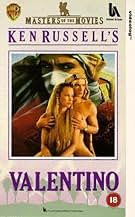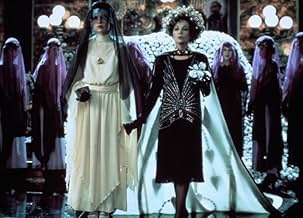IMDb RATING
6.1/10
2.5K
YOUR RATING
In 1926 the tragic and untimely death of a silent screen actor caused female moviegoers to riot in the streets and in some cases to commit suicide.In 1926 the tragic and untimely death of a silent screen actor caused female moviegoers to riot in the streets and in some cases to commit suicide.In 1926 the tragic and untimely death of a silent screen actor caused female moviegoers to riot in the streets and in some cases to commit suicide.
- Nominated for 3 BAFTA Awards
- 4 nominations total
Emily Bolton
- Bianca de Saulles
- (as June Bolton)
6.12.4K
1
2
3
4
5
6
7
8
9
10
Featured reviews
I just recently bought this movie and can't stop watching it
From start I knew this would be a great movie. I was very pleased with how the beginning was done. You're able to see newspaper articles telling you how Valentino died. Then you see real footage of people causing a riot as they try to break into where Valentino's body is. The footage is in black and white and then it turns to color. That was very well done too. How they were able to reenact the real footage. The song they also play in the beginning was a great song.
I thought the acting in this movie would be terrible, especially by Rudolf Nureyev. He turned out to be a very good actor in the movie. He was also very good in the dance scenes. I never found anything in this movie to displease me. However, there was one scene with Valentino and an actress from one of his movies he is working on that I thought was unnecessary. The scene comes right after one of the light technicians drops a pink powder puff on him. He has to sleep with the actress to prove he isn't a pink powder puff. Then later in the movie came a boxing scene were Rudolph Valentino wanted to prove his manhood. That was a very good scene. I think the point were I really started to like the movie was when Valentino was riding home with his dog. Who better then to do a biopic on Rudolph Valentino? This is a great movie with great acting, writing and direction.
See this great movie about an icon.
I thought the acting in this movie would be terrible, especially by Rudolf Nureyev. He turned out to be a very good actor in the movie. He was also very good in the dance scenes. I never found anything in this movie to displease me. However, there was one scene with Valentino and an actress from one of his movies he is working on that I thought was unnecessary. The scene comes right after one of the light technicians drops a pink powder puff on him. He has to sleep with the actress to prove he isn't a pink powder puff. Then later in the movie came a boxing scene were Rudolph Valentino wanted to prove his manhood. That was a very good scene. I think the point were I really started to like the movie was when Valentino was riding home with his dog. Who better then to do a biopic on Rudolph Valentino? This is a great movie with great acting, writing and direction.
See this great movie about an icon.
Ken Russell's Brilliant and Irreverent Valentino Bio.
As in all of his biography films Ken Russell takes no prisoners. A series of warped biographies on composers (Mahler, Tchaikovsky, List)incensed more than entertained audiences and critics. Laced with dark humor, vibrant costuming and Russell's sardonic use of the composers works in conjunction with his colorful and outlandish compositions the films were visual feasts that bordered on character assassination.
In Valentino, Russell comes to America to offer his take on silent Hollywood and its biggest star of the era, Rudolph Valentino. Russell is relentless in his depiction of the exploitative and greedy nature of producers who in the opening scene stand over Valentino's body lamenting financial loss. Russell also works over newspaper reporters, actresses, Valentino's ex-wives and a comedian known as Fatty (Arbuckle?). Dancer, Rudolph Nureyev is no actor but as Valentino his poorly pronounced flatly emoted English fits and contributes to his sympathetic character.
As in all Russell films there are scenes that are lush and grandly staged (ably assisted by ex-wife, Shirley Russell's original and over the top costuming) such as Leslie Caron's entrance at the funeral home, the fight sequence where ball room dancing takes place in between rounds, the producer with the pet gorilla in his living room, and a cult fan gathering outside Valentino's mansion.
This film quickly sank from sight when it was released and thirty years later consensus remains the same. I personally believe however that Valentino is a sharply drawn dark humored satire that spits cynicism at two institutions (Hollywood and the media) that it depended heavily on for its success. Valentino succeeds on every level and that was probably its problem.
In Valentino, Russell comes to America to offer his take on silent Hollywood and its biggest star of the era, Rudolph Valentino. Russell is relentless in his depiction of the exploitative and greedy nature of producers who in the opening scene stand over Valentino's body lamenting financial loss. Russell also works over newspaper reporters, actresses, Valentino's ex-wives and a comedian known as Fatty (Arbuckle?). Dancer, Rudolph Nureyev is no actor but as Valentino his poorly pronounced flatly emoted English fits and contributes to his sympathetic character.
As in all Russell films there are scenes that are lush and grandly staged (ably assisted by ex-wife, Shirley Russell's original and over the top costuming) such as Leslie Caron's entrance at the funeral home, the fight sequence where ball room dancing takes place in between rounds, the producer with the pet gorilla in his living room, and a cult fan gathering outside Valentino's mansion.
This film quickly sank from sight when it was released and thirty years later consensus remains the same. I personally believe however that Valentino is a sharply drawn dark humored satire that spits cynicism at two institutions (Hollywood and the media) that it depended heavily on for its success. Valentino succeeds on every level and that was probably its problem.
Grotesque yet fun...
Who knows if any of this is true, but director Ken Russell's take on the life of Rudolph Valentino is a lot of fun. Opening at Valentino's infamously raucous funeral, the film is told in flashbacks by various people who knew him. That's where any similarity to CITIZEN KANE ends. Russell is a master of opulence and it's clear that no money was spared. The sets and costumes are spectacular, but they're nearly overshadowed by Russell's casting choices. Michelle Phillips plays Valentino's wife Natasha, Leslie Caron is the great Nazimova and one time Dead End kid Huntz Hall is Paramount chief Jesse Lasky. Bizarre casting to be sure, but all three are surprisingly good. Caron in particular seems to be having a really good time. In hindsight, the casting of Rudolf Nureyev as the world's "greatest lover" seems ironic, but he isn't bad. It is too bad he has to speak. There are times he's incomprehensible. The direction is fairly straightforward, although Caron's funeral scene entrance and Valentino's jail house encounter are vintage Russell --- they're nearly operatic. Carol Kane and Seymour Cassel are in it too.
A camp extravaganza
Filled with wonderful moments, Valentino, ultimately collapses under the weight of its overblown and raucous fairground antics. It must have been an amazing coup to get Rudolf Nureyev to play the infamous Rudolph Valentino but there is just too much going on and some scenes going on for too long. The costumes, by the director's then wife Shirley are amazing but really only help to feed in to the overall campiness of the proceedings. I can imagine Ken bouncing about encouraging everyone to give it their all and this certainly seems to have born fruit with Peter Vaughan's ecstatic performance towards the end but it also means that poor little Felicity Kendal, always the most measured of actresses, actually overacts here. A camp extravaganza that I'm sure many can enjoy but I would have preferred just a little more insight. The Fatty Arbuckle portrayal is unforgivable, never mind that of Valentino himself.
eek! it's the Sheik!
In Australia in 1977 we were in the boom years and love affair with colour TV. Most cinema releases movies at the box office dropped dead.. and most were very good... or at least interesting.... VALENTINO was one of them. A wildly ambitious and quite well imagined 1920s fiction on Valentino's career and loves, this Ken Russell pic has spectacular imagery and hilarious casting (Huntz Hall as the head of Paramount) but as usual in a Russell film was seriously derailed by grotesque sexual moments. The film has a great sense of time and place and with great female casting, spectacular dance scenes and breathtaking art direction VALENTNO gives the viewer 2 hours of lavish early 20s Hollywood life. Any film with both Carol Kane and Leslie Caron with Nureyev must be seen to be believed anyway. Some cinemas of the time (well, mine anyway) ran it as a double feature with NEW YORK NEW YORK and found the same audience enjoyed both... even if they needed a meal break and a walk around the block to get through this 5 hour musical fruit salad. In the same week we also ran THE WORLD'S GREATEST LOVER which, also with Carol Kane and equally gorgeous 20s visuals missed its mark because of the insufferable antics of Gene Wilder over-eating the whole production. Yes, over-eating. Nobody survived.
Did you know
- TriviaReportedly, the film's director Ken Russell walked out of a revival screening of this movie saying: "What idiot made this?".
- GoofsThe intertitles in the silent film recreations always include who's speaking. This was never done. Additionally, the Algerian font is incorrect. Most silents either used Pastel or were hand-lettered.
- Quotes
Hooker: Oh, hi!
George Ullman: Oh, Christ.
Hooker: Wanna have a good time?
Rudolph Valentino: Which one?
Hooker: Oh-oh, I can handle two at once. I got the sockets if you got the plugs.
- ConnectionsFeatured in Tango Bar (1987)
- SoundtracksNew Star in Heaven Tonight
Sung by Richard Day-Lewis
Lyrics by J. Keirn Brennan, Irving Mills (uncredited)
Music by Jimmy McHugh (uncredited)
- How long is Valentino?Powered by Alexa
Details
Box office
- Budget
- $5,000,000 (estimated)
Contribute to this page
Suggest an edit or add missing content










































